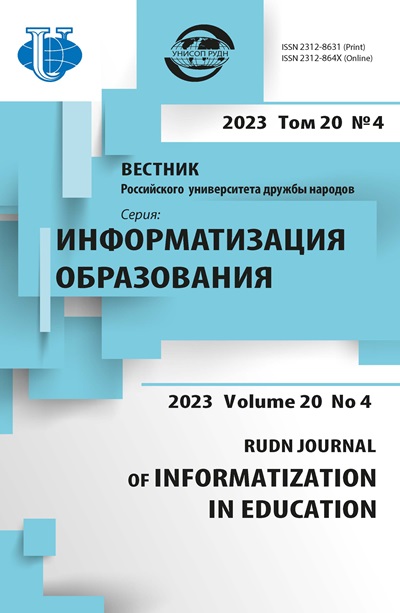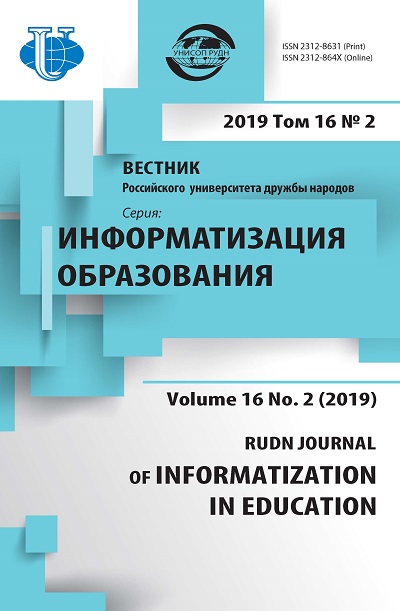A Moodle-based vocational English course for master’s degree students in nonlinguistic settings: designing and implementing
- Authors: Galchuk L.M.1
-
Affiliations:
- Novosibirsk State University of Economics and Management
- Issue: Vol 16, No 2 (2019)
- Pages: 173-184
- Section: EDUCATIONAL ELECTRONIC PUBLICATIONS AND RESOURCES
- URL: https://journals.rudn.ru/informatization-education/article/view/21649
- DOI: https://doi.org/10.22363/2312-8631-2019-16-2-173-184
Cite item
Full Text
Abstract
Problem and goal. The article is devoted to the problem of pedagogical design of e-learning course as an element of innovative system of foreign language professionally oriented training of masters of non-linguistic specialties, analysis of potential opportunities and risks of its implementation. The relevance of the research is connected with the need to accumulate professional experience in the development and piloting of electronic educational resources in the conditions of digitalization of the Russian educational space and the creation of a single, public portal-aggregator of online courses. Methodology. The initial prerequisites of the work were theoretical and applied research in the field of professional and electronic linguodidactics in Russia and abroad. The concept of the considered electronic resource was formed in line with the communicative and competence approaches, the requirements of the modern educational paradigm, philosophy and structural parameters of the virtual learning environment Moodle. Innovative parameters of the content and structure of the course are determined by its design on the principle of reverse design and technology of implementation within the educational paradigm of mixed subject-language integrated learning. Results. The practical significance of the work lies in the fact that the didactic model presented in the study can be considered as a network component of the linguistic professional learning environment, which is formed in line with the trend towards the early professionalization of a foreign language course in a non-linguistic university. Conclusion. This paper presents the concept of innovative educational resource and its implementation using information and communication technologies - e-learning course “English for students of financial and economic specialties enrolled in master’s programs”. It covers topics that involve the development of knowledge gained in the study of related subject areas (financial management, accounting, banking, finance and credit, stock markets, risk management, etc.) and the experience of professional masters.
About the authors
Larisa M. Galchuk
Novosibirsk State University of Economics and Management
Author for correspondence.
Email: galaris_nsk@mail.ru
candidate of philological sciences, associate professor, associate professor of the department of foreign languages of Novosibirsk State University of Economics and Management
56 Kamenskaya St., Novosibirsk, 630099, Russian FederationReferences
- Gal’chuk L.M. Elektronnyj kurs “Anglijskij yazyk dlya studentov finansovo-ekonomicheskih special’nostej, obuchayushchihsya po programmam magistratury” [E-course “English for students of financial and economic specialties, enrolled in master’s programs”]. Hroniki Ob’edinennogo fonda elektronnyh resursov nauka i obrazovanie [Chronicles of the Joint fund of electronic resources “Science and education”]. 2018. No. 5(108). P. 1.
- Garcov A.D. Informacionno-kommunikacionnye tekhnologii kak sposob optimizacii podgotovki specialista v sfere professional’no-delovogo obshcheniya [Information and communication technologies as a way to optimize the training of specialists in the field of professional and business communication]. Moscow: RUDN Publ., 2008. 127 p.
- Gendina N.I. Informacionnaya kul’tura v informacionnom obshchestve: vzglyad iz Rossii [Information culture in the information society: a view from Russia]. http://www.ifapcom.ru/files/Monitoring/ gendina_infocult.pdf (accessed: 12.01.2019).
- Grishaeva A.V. Ispol’zovanie formy smeshannogo obucheniya v prepodavanii inostrannogo yazyka studentam neyazykovyh special’nostej [The use of the form of blended learning in the teaching of a foreign language to students of non-linguistic specialties]. Vestnik Tomskogo gosudarstvennogo pedagogicheskogo universiteta [Bulletin of Tomsk State Pedagogical University]. 2015. No. 4(157). Pp. 70—74.
- Dobrydina T.I., Maslennikova O.G., Nadezhdina Е.Yu. Perspektivy ispol’zovaniya virtual’noj obrazovatel’noj platformy Moodle v obuchenii inostrannym yazykam [Prospects for the use of virtual educational platform Moodle in teaching of foreign languages]. Vestnik Kemerovskogo gosudarstvennogo universiteta [Bulletin of Kemerovo State University]. 2014. Vol. 2. No. 3(59). Pp. 282—287.
- Еvdokimova M.G. Innovacionnaya sistema professional’no orientirovannogo obucheniya inostrannym yazykam v neyazykovom vuze [Innovative system of professionally oriented foreign language teaching in a non-linguistic university]. Moscow: Biblio-Globus Publ., 2017. 436 p.
- Ivkina M.V. Obuchenie inostrannomu yazyku v sisteme Moodle s primeneniem informacionnyh komp’yuternyh tekhnologij [Teaching a foreign language in the Moodle system with the use of information computer technologies]. Samara: SGAU Publ., 2012. 68 p.
- Issledovaniya rossijskogo rynka onlajn-obrazovaniya i obrazovatel’nyh tekhnologij [Research of the Russian market of online education and educational technologies]. https://reports.edumarket.digital/ edumarket.digital_p1_rus.pdf (accessed: 12.01.2019).
- Mil’rud R.P. Aktual’nye problemy yazykovoj andragogiki [Actual problems of language andragogy]. Voprosy sovremennoj nauki i praktiki. Universitet imeni V.I. Vernadskogo [Problems of Contemporary science and practice. Vernadsky University]. 2016. No. 1(59). Pp. 176—180.
- Nazarenko A.L. Informacionno-kommunikacionnye tekhnologii v lingvodidaktike: distancionnoe obuchenie [Information and communication technologies in linguodidactics: distance learning]. Moscow: Moskovskii universitet Publ., 2013. 279 p.
- Pasport prioritetnogo proekta “Sovremennaya cifrovaya obrazovatel’naya sreda v Rossijskoj Federacii” (utverzhden prezidiumom Soveta pri Prezidente RF po strategicheskomu razvitiyu i prioritetnym proektam. Protokol № 9 ot 25.10.2016) [Passport of the priority project “Modern digital educational environment in the Russian Federation” (approved by the presidium of the presidential council for strategic development and priority projects. Protocol No. 9 of 25.10.2016)]. http://government.ru/ media/files/8SiLmMBgjAN89vZbUUtmuF5lZYfTvOAG.pdf (accessed: 12.01.2019).
- Petrova N.V. Razrabotka vstroennoj v instrumental’nuyu sistemu tekhnologii obucheniya sozdaniyu elektronnogo kursa po inostrannomu yazyku [Development of embedded in the instrumental system technology of teaching the creation of an electronic course in a foreign language]. Vestnik Sibirskogo instituta biznesa i informacionnyh tekhnologij [Bulletin of the Siberian Institute of Business and Information Technology]. 2016. No. 3(19). Pp. 146—151.
- Polat Е.S., Buhankina M.Yu., Moiseeva M.V. Teoriya i praktika distancionnogo obucheniya [Theory and practice of distance education]. Moscow: Akademiya Publ., 2004. 416 p.
- Popkova Е.M. Tipologiya bar’erov v andragogicheskoj modeli obucheniya inostrannym yazykam i metody ih preodoleniya [The typology of barriers in the andragogical model of teaching foreign languages and methods of their overcoming]. Inostrannye yazyki: teoriya i praktika [Foreign languages: theory and practice]. 2010. No. 2(11). Pp. 50—59.
- Prokof’eva A.L. Primenenie elektronnyh uchebnyh kursov v processe izucheniya inostrannogo yazyka v vysshem uchebnom zavedenii [The use of electronic training courses in the process of learning a foreign language in higher education]. Informacionno-upravlyayushchie sistemy [Information management systems]. 2015. No. 6(79). Pp. 98—104.
- Cifrovaya Rossiya: novaya real’nost’. Otchet Digital McKinsey [Digital Russia: a new reality. Digital McKinsey Report]. July 2017. http://www.mckinsey.com/russia/our-insights/ru-ru (accessed: 12.01.2019).
- Dougiamas M. A Journey into Constructivism. 1998. http:// dougiamas.com/archives/a-journeyinto-constructivism/ (accessed: 12.01.2019).
- Laurillard D. Rethinking University Teaching: A Framework for the Effective Use of Educational Technologies. London; New York: Routledge/Falmer, 2002. 268 p.
- Moore M.G. Editorial: Three Types of Interaction. The American Journal of Distance Education. 1989. Vol. 3. No. 2. Pp. 1—7. http://aris.teluq.uquebec.ca/portals/598/t3_moore1989.pdf (accessed: 12.01.2019).
- Sharma P., Barrett B. Blended learning: using technology in and beyond the language classroom. Oxford: Macmillan Education, 2007. 160 p.
















